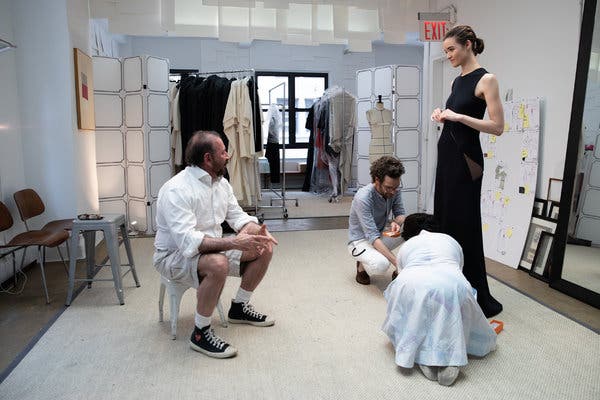
CreditJackie Molloy for The New York Times
In 2014 Ralph Rucci — the first American to show on the Paris couture schedule under his own name since Mainbocher in the 1930s, recipient of a National Design Award from the Cooper-Hewitt National Design Museum, someone whose work Oprah Winfrey once called “a religious experience” — became a member of a club no designer wants to join: The one where you lose your name.
He left behind the eponymous house he had founded in 1994, Chado Ralph Rucci — which was rechristened just Ralph Rucci in 2013 after Howard and Nancy Marks became majority investors — joining such peers as Hervé Léger and John Galliano in the strange wilderness where brand and body are separated.
This week, he came back.
On Sunday, Mr. Rucci held his first couture show in 12 years, under a new moniker, RR331, which sounds like R2D2’s weird uncle. Actually it is a combination of his initials and the number of steps in the Japanese tea ritual, a reference to his former brand name, which was itself a reference to his exacting and time-intensive approach to design.
At the Ritz in front of 150 people — most of them clients, or potential clients, the show featured his trademark precision cutting, intricate construction and sense of deep-pile luxe. And it marked him out again as what the editor André Leon Talley calls “a fashion Fabergé egg” as well as a “survivor, risen from the ashes.”
Recently Mr. Rucci got on the phone to discuss what that meant. This conversation was edited and condensed.
Why did you decide to come back to couture?
I started again because I had to jump back into life; sort out the past. For the last three years, I have been doing made-to-order clothes, mostly for women who get on planes to go to boardrooms. I made one attempt to get back into ready-to-wear in 2016, but realized there was no future in it; my clothes were too expensive, and don’t fit into fashion at the moment: there are no prints, there are no lavish statements. I’ve reduced every single piece to the barest essence of what it has to speak. But it became clear I had to present in Paris. Women don’t come to New York to order couture.
So in October I said, “O.K. I have to do this,” and in January I went and met with Pascal Morand, executive president of the Fédération de la Haute Couture et de la Mode. They were wonderful and complimentary, but I had to reapply and I needed a letter of recommendation. I got a wonderful letter from Giancarlo Giammetti and Valentino, and the vote was taken four months after that. I’m going to be 62 on July 31, and this is the best birthday present I’ll ever have.
Is it different this time around?
It’s like starting again. I’ve done this collection with a very small staff — nothing like what I’ve had in the past. I’m the only employee except my sister and my two assistants. I’m working out of my house. Then I also work with Nicolas Caito, a premier pattern maker with his own studio, who provides me with the team I need to prepare the toiles and patterns. But I have no partner. I’m funding it all myself. There’s no one telling me ‘You can’t use this double-face cashmere.’ No one telling me ‘You can’t make two sable coats.’ I was in shops buying zippers and buttons. It was totally liberating. But I consistently have to go back and put myself in a mental comfort zone so I can be decisive, design, create and also handle deliveries, billing, tracking wires, negotiations.
What went wrong?
I was self-financed for 33 years. By 2000 we built a ready-to-wear business that allowed me to finance couture. But after 2008, when the economy collapsed, I needed some support. For example, from one season to the next in Paris the lights over the runway went from 20,000 euros to 60,000 euros. Then these individuals were clients and they came forth and offered support. In hindsight, I would have handled things differently. But when you have conversations all about growth and mutual respect, you don’t think about what might happen. I will always have the greatest respect and admiration for Mr. Howard Marks, but of the people around him I have nothing to say. I made the decision to leave on my own. I knew my name was owned and I knew I had to leave it.
Is there a lesson in that experience?
I was in shock for one year. If there’s one thing I’ve learned, it’s that humility is the most important thing to carry yourself forward. But I also knew my name did not mean as much as my health. Everyone refers to this now as Ralph Rucci. The only one who cannot say it is myself.
How has fashion changed?
Now designers are required not to be designers but to be stylists of society and the moment. It’s not important you know how to make clothes with dignity. But I was never part of the fashion world. I did things exactly the way I wanted to do it and did not play politics. First I was able not to, then I couldn’t afford to. Now I’m coming back quietly. For me, this isn’t about money — I need back what I put in and then half of that so we can take orders and make the next collection — it’s about a language and a culture. When I get back from Paris I found a space we’re going to move into on the Upper East Side. Not Seventh Avenue. I can’t go back there. It’s too scary. I hate those elevators.







